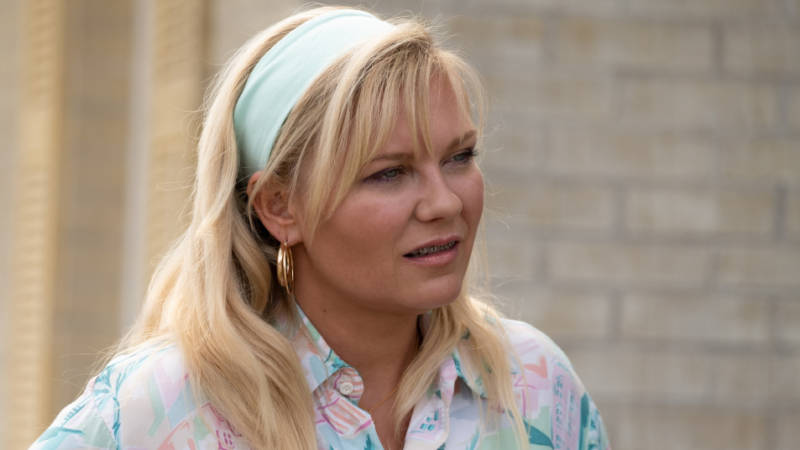Unfortunately, the rest of the series is uneven. There are ten episodes in On Becoming A God, and it would probably be stronger if there were six. The show is at its best when it stays with Krystal as she goes to war with a the wealthy crooks whose entire business plan is persuading poor people to take advantage of each other, promising good fortune that will never arrive. Krystal winds up entangling her kindhearted manager, Ernie (Mel Rodriguez), in FAM as well. The mess this creates for him and his wife Bets (musician Beth Ditto, who’s very good) helps to underscore the destructiveness of this company. So does the fact that Ernie’s most successful idea is to recruit those with even fewer prospects than he has: undocumented people who can’t work legally, but who are welcome to pay their money to sign up with FAM.
Eventually, Krystal comes to share the focus with Cody, who resembles one kind of jerk at the beginning and proves to be a different kind of jerk entirely—a weaker, more frightened, more desperate one. Pellerin is committed and funny, but the more Cody wanders around miserably from one manipulator to another, the less payoff there is. His character, limited as he is in intelligence and wit, can only go so far, and while he works wonderfully as an accessory to Krystal’s story, the parts of the show that turn him into a protagonist are much less successful.
But the biggest disappointment is that what begins as an incisive critique of a straight-up scam for money veers into a much broader, sillier critique of cults and woo-woo spirituality as Krystal explores more of FAM. The nickel-and-dime aspects of FAM selling cassette tapes and obsessing over your “downline” and your recruiting numbers feel fresh, but once you get to revival-style meetings and robes and birthing rituals, it feels a lot like a televangelist satire, more familiar and less cutting.
Going broader and broader in this case doesn’t feel like a natural progression; it honestly feels like an expansion of an idea that’s more like a movie in order to make it into a series. Krystal, Travis, the basics of FAM, the water park, Ernie, Bets—those elements feel like parts of the core idea. Hallucinations, visions, creepy assassins, mysterious rituals—that all feels tacked on.
On Becoming A God in Central Florida has had a bumpy ride in which it was first being developed at AMC in 2017, then went to YouTube Premium before being picked up by Showtime. Whether the lumpiness of the season has anything to do with the somewhat arduous journey, we can’t know. But somewhere, the focus went fuzzy.
It’s too bad the show can’t quite stay at the level where it starts, because there’s a sharp point to be made here. All monsters feed on something, and FAM feeds on a combination of economic despair and the fetishization of wealth. The thesis of the best parts of this story is that being scammed is not a symptom of personal foolishness but of broad dysfunction that keeps ordinary people under constant threat of financial ruin while waving under their noses the idea that the goal is not security; it is extravagance without work. People don’t join FAM being promised only the traditionally defined “American dream” of home and family and cars and nice vacations. They join because they’re told they can be idle millionaires—even idle billionaires.
It didn’t need so much cartoonish stuff around the edges; it just needed Krystal, facing down the fraudulent dream that took away her husband. That material, in Dunst’s hands, is very effective and engaging, and very funny. But like Krystal’s husband, it could have used a little more restraint.
Copyright 2019 NPR. To see more, visit NPR.9(MDAxOTAwOTE4MDEyMTkxMDAzNjczZDljZA004))

9(MDAxOTAwOTE4MDEyMTkxMDAzNjczZDljZA004))

